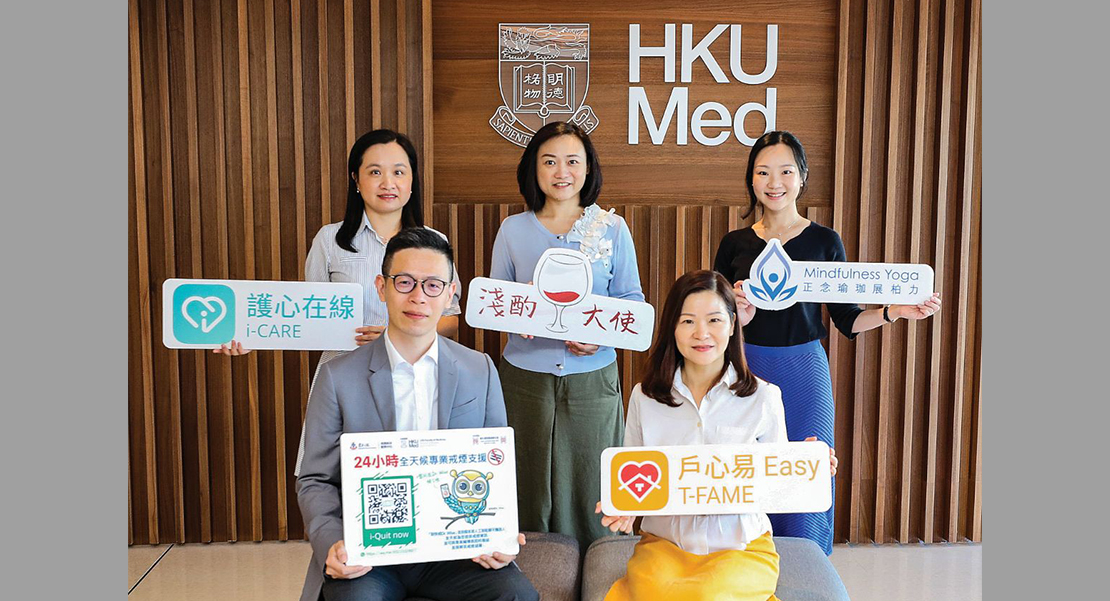Innovations Advance Nursing in the Era of COVID-19
Professor Doris Yu Sau-fung | Professor and Chair of Research
Dr Janet Wong Yuen-ha | Associate Professor
Dr Kelvin Wang Man-ping | Associate Professor
Dr Polly Li Wai-chi | Assistant Professor
Dr Jojo Kwok Yan-yan | Assistant Professor
Tech-based health innovation is critical for optimising risk control and management of patients with chronic conditions, which are ever-growing in number. The COVID-19 pandemic has further catalysed its development and validated its benefits in the wake of reduced health service capacity and social distancing policy, both of which have hindered the feasibility and availability of conventional chronic care models.
“COVID-19 has brought many challenges, but it has also sharpened our focus on tech-based innovations,” said Professor Doris Yu Sau-fung, Chair of Research in the School. “Some of our innovations are new, others have been under development for a while but have new impetus. The pandemic has provided a real-life scenario that is demonstrating the great value that technology can bring to contemporary nursing.”
To tackle the rapidly-growing chronic disease burden, the School has intensified its research focus across the continuum, from risk factor control to advanced management of chronic diseases. Its tech-based innovations have been developing along parallel lines and include a gamified digital programme to reduce alcohol consumption and abuse among young adults, a chatbot and WhatsApp programme to support smokers in quitting the habit, internet-based intervention for patients with coronary heart disease, a website with Zoom sessions offering guided yoga for patients with Parkinson’s Disease, and a hybrid physical-digital family-based transitional care model for patients with heart failure.
Gamified intervention on reducing alcohol consumption
A key factor motivating alcohol consumption among young adults and adolescents is peer pressure. Associate Professor Dr Janet Wong Yuen-ha has devised a novel way to address that pressure and better inform young people of the dangers of alcohol by gamifying their learning.
Gamification, like the other innovations described on these pages, is an interactive, technology-based strategy. It utilises the popularity of gaming among young people to convey lessons and information. In this case, Dr Wong has used it as an intervention model to correct misperceptions of peer drinking norms. Players are asked to estimate the drinking behaviours of their peers and they receive rewards for correct answers.
“We hypothesise that gamification will be able to reduce ideas about perceived drinking norms in peers and eventually reduce participants’ own alcohol drinking behaviours,” Dr Wong said.
The project was launched in April 2021. It is the first stage of game development and creation and, it is hoped, will have the added benefit of being able to reach its target audience even during social restrictions related to the COVID-19 pandemic.
Chatbot for smoking cessation
Quitting smoking with assistance dramatically increases success rates. The School of Nursing has been a leader in providing such assistance through its community smoking cessation programmes. Recently, Associate Professor Dr Kelvin Wang Man-ping and his team tapped into new technologies to connect with more smokers and respond to their needs.
They first developed a model using WhatsApp to recruit smokers, give them advice and connect them to smoking cessation clinics. When this was combined with brief smoking cessation interventions, they were able to substantially increase the likelihood of quitting – about 8.1% of participants in that programme were verified as quitting at the six-month follow-up versus 5.1% in the control group. However, while this proactive model is effective, its reach has been limited to smokers approached by Dr Wang’s team and by normal working hours.
To expand the reach, they have developed a chatbot powered by AI with HKU’s Department of Electrical and Electronic Engineering and Technology-Enriched Learning Initiative. The chatbot provides practical information, such as details on cessation services and skills for tackling cravings. A second-generation chatbot can now deliver personalised risk information and recommendations for smoking cessation using natural language processing, as well as offer access to a counsellor through WhatsApp for urgently needed advice. The team started rolling out this version in the Tung Wah Group of Hospitals’ Integrated Smoking Cessation Centres in May this year.
“Recent advances in mobile information and communication technologies, and the widespread use of mobile devices, offer a new avenue for healthcare provision,” Dr Wang said. “It should also be noted that digital health interventions are particularly beneficial during the COVID-19 pandemic, which has disrupted traditional addiction services that involve in-person counselling.”
i-CARE means self-care for coronary artery disease patients
Coronary artery disease (CAD) is a serious and growing problem worldwide. Cardiac rehabilitation has proven to be beneficial to the health outcomes in CAD patients, yet services are mostly targeted at patients after an acute exacerbation of CAD, while those with stable CAD who have not yet experienced an acute event have received far less attention – until now.
Assistant Professor Dr Polly Li Wai-chi and her team have developed the mobile app i-CARE, which stands for internet-based cardiac rehabilitation enhancement. The app has three components that provide patients with guided information and knowledge about self-care, as well as feedback as needed.
In the self-monitoring dashboard, participants select parameters for blood pressure, heart rate, lipid profile, blood glucose and the like, which they are able to monitor on a regular basis.
Interactive self-care modules provide videos and illustrations on relevant topics such as CAD manifestations, symptom monitoring, medication management and activity and exercise. Participants are guided to establish individualised self-care goals and an action plan.
Finally, a chat room connects participants to a nurse who can provide coaching and motivation on behavioural changes. The nurse also reviews the self-monitoring data, keeps track of progress and explores any underlying barriers that the users may have with adherence to their regime.
The project will be tested on a group of CAD patients through a randomised controlled trial before it is formally launched. “We hope this mobile application can provide a theory-guided, internet-based self-care intervention and promote self-care of patients with CAD,” Dr Li said
A tech approach to mindfulness yoga for Parkinson’s Disease patients
COVID-19 has been particularly difficult for patients with long-term neurological conditions due to social distancing and other public health measures and the closure of community centres and gyms, which has disrupted rehabilitation services. But Assistant Professor Dr Jojo Kwok Yan-yan has found a solution. Building on a mobile-friendly website she developed on mindfulness yoga for Parkinson’s Disease (PD), she and her team have developed a bi-weekly 90-minute programme via Zoom.
The website, based on mHealth (for mobile health), initially provided videos for patients to practice mindfulness yoga at home. This was adapted for Zoom in response to the pandemic and tested last summer with good effect.
The sessions were held live, with safety the top priority. All participants were instructed to perform the guided online yoga practice next to a wall and sturdy chair for additional support, with a caregiver nearby if needed. Two team members observed participants throughout the sessions to ensure their safety. If they spotted a fall or risk of injury or fall, they immediately contacted the participant or caregiver via Zoom or phone.
“The tele-rehabilitation approach was well-accepted by patients – in fact, the qualitative feedback we received revealed a high preference for this approach to staying mindful and being active while confronting the challenges brought by the COVID-19 pandemic,” Dr Kwok said.
The “mindfulness” aspect of the practice via virtual delivery, however, was unclear. Future trials will try to assess strategies for optimising the “in-the-moment” experiences of patients using this approach.
T-FAME for heart failure patients
T-FAME is the acronym for Technology-based Family-centred Empowerment, a programme to support heart failure patients and their families in the immediate period after being discharged from hospital. The need for such a service is acute. Hospital stays for these patients have been shortening due to overstretched hospital services in Hong Kong, while there has also been a lack of infrastructure and staffing to optimally coordinate and provide continuity of care for patients. At the same time, the 4-week and 6-month hospital readmission rates for this clinical cohort may be nearing peaks of 25% and 50%, respectively. This is a healthcare issue that can no longer be ignored and T-FAME offers a potential resolution.
T-FAME, led by Professor Yu, is a hybrid post-discharge care model combining low-intensity home care and an interactive app to optimise professional-family-patient care collaboration. More specifically, T-FAME integrates extended digital health monitoring to detect and deter early disease deterioration through programmed or real-time nursing advice. It also helps patients and families to set goals to enhance disease management, which are uploaded to the app so they can track progress and obtain the relevant automated motivational feedback, and offers about 40 interactive videos to empower families and patients to rationalise the disease and symptoms, engage in self-care decision making, and practise skills for health maintenance. Moreover, the app uniquely enriches proactive self-care by providing automated alerts on temperature, air quality and humidity, which other research has shown are related to increased hospital admissions of heart failure patients.
A clinical trial of T-FAME got underway in July this year. “We will examine the effects and cost-effectiveness of the app on patients’ outcomes, family caregivers’ health outcomes and the use of hospital services. Our hope is that T-FAME will enhance the post-discharge outcomes of patients and reduce some of the burden on our overstretched healthcare system,” Professor Yu said.










